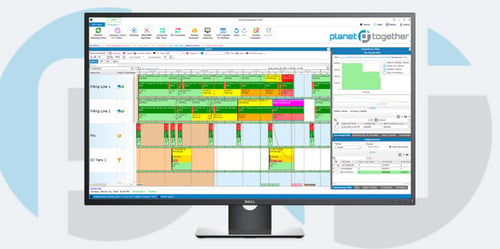Adopting Predictive Analytics in Industrial Manufacturing: A Strategic Imperative for Purchasing Managers
In industrial manufacturing, efficiency, cost control, and supply chain resilience have become essential for Purchasing Managers. With the increasing complexity of global supply chains, volatile market conditions, and the rising pressure to maintain profitability, organizations are turning to advanced digital solutions to gain a competitive edge. One such transformative approach is predictive analytics—a data-driven methodology that leverages artificial intelligence (AI), machine learning (ML), and statistical modeling to forecast future trends and optimize procurement strategies.
As industrial manufacturers seek to maximize operational efficiency, integrating predictive analytics into purchasing and supply chain management—particularly through advanced planning and scheduling (APS) tools like PlanetTogether, in conjunction with ERP systems such as SAP, Oracle, Microsoft Dynamics, Kinaxis, and Aveva—has become a game-changer.
This blog explores the growing adoption of predictive analytics in industrial manufacturing procurement, its benefits, and how Purchasing Managers can effectively leverage this technology to streamline operations and enhance decision-making.

The Role of Predictive Analytics in Procurement
Predictive analytics in procurement revolves around leveraging historical and real-time data to anticipate future demands, supplier performance, price fluctuations, and potential disruptions. By analyzing patterns and trends, manufacturers can proactively make informed purchasing decisions, ensuring cost efficiency and supply chain resilience.
Key Applications of Predictive Analytics in Industrial Manufacturing Procurement
Demand Forecasting and Inventory Optimization
Predictive models analyze historical order patterns, market trends, and external variables (such as economic conditions and seasonality) to anticipate future demand. This helps Purchasing Managers determine optimal procurement quantities, reducing excess inventory and minimizing stockouts.
Supplier Performance Evaluation
Advanced analytics assess supplier reliability by tracking on-time delivery rates, defect rates, and compliance with quality standards. By identifying potential risks associated with supplier performance, Purchasing Managers can mitigate supply chain disruptions and negotiate better contracts.
Price Trend Analysis and Cost Savings
Predictive analytics leverage real-time market data to forecast price fluctuations in raw materials and components. This insight enables Purchasing Managers to time their purchases strategically, locking in favorable pricing and reducing procurement costs.
Risk Mitigation in Supply Chain Disruptions
By incorporating external factors—such as geopolitical risks, climate conditions, and trade policies—predictive analytics helps manufacturers anticipate potential supply chain disruptions. This proactive approach ensures contingency plans are in place, reducing operational downtime.
Optimized Supplier Selection and Sourcing Strategies
AI-powered algorithms analyze supplier data and market conditions to recommend the most cost-effective and reliable suppliers. This allows Purchasing Managers to enhance supplier diversification and improve procurement efficiency.

The Power of PlanetTogether APS in Predictive Procurement
PlanetTogether APS is a best-in-class Advanced Planning and Scheduling system that synchronizes procurement with production schedules. By integrating predictive analytics, it provides Purchasing Managers with actionable insights to make informed buying decisions.
Real-Time Demand Forecasting
PlanetTogether’s APS engine analyzes historical data and real-time production schedules to predict raw material requirements.
It integrates with ERP systems like SAP, Oracle, Microsoft, Kinaxis, and Aveva to ensure material availability aligns with production demands.
✅ Impact: Purchasing Managers can avoid over-purchasing or under-purchasing, ensuring cost efficiency.
Supplier Performance Analytics
Predictive analytics evaluates on-time delivery rates, defect percentages, and price trends for each supplier.
With PlanetTogether’s supplier tracking features, purchasing teams can select the best suppliers based on past performance and risk assessment.
✅ Impact: Stronger supplier relationships, reduced procurement risks, and better contract negotiations.
Automated Purchase Order Optimization
PlanetTogether APS analyzes production schedules and supplier lead times to recommend optimal procurement timings.
Integration with ERP solutions like SAP or Oracle ensures automated purchase requisitions based on real-time forecasts.
✅ Impact: Eliminates manual purchasing inefficiencies and reduces procurement cycle times.
Inventory Optimization and Cost Control
AI-driven analytics within PlanetTogether predicts material usage patterns and suggests optimal stocking levels.
Purchasing Managers can use insights to balance inventory levels and avoid excess carrying costs.
✅ Impact: Reduces working capital tied in inventory while preventing stockouts.
Risk Mitigation and Disruption Planning
PlanetTogether APS integrates external risk factors (supplier failures, geopolitical changes, material price fluctuations) into procurement planning.
AI models simulate multiple supply chain scenarios, allowing purchasing teams to prepare for potential disruptions.
✅ Impact: Increases supply chain resilience and reduces downtime risks.

The Business Impact of Predictive Analytics with PlanetTogether APS
For Purchasing Managers in industrial manufacturing, integrating predictive analytics with PlanetTogether APS brings measurable benefits:
Cost Savings: Optimized purchasing schedules reduce excess inventory costs and eliminate unnecessary spending on rush orders.
Efficiency Gains: Automated procurement processes reduce manual workloads, allowing Purchasing Managers to focus on strategic decision-making.
Improved Supplier Collaboration: Real-time supplier performance tracking fosters stronger relationships and better contract terms.
Enhanced Supply Chain Resilience: Anticipating disruptions before they occur minimizes production downtime.
Sustainability and Waste Reduction: Data-driven purchasing minimizes raw material wastage, contributing to green manufacturing initiatives.
For Purchasing Managers in industrial manufacturing facilities, the adoption of predictive analytics is no longer an option—it’s a competitive imperative. By leveraging advanced APS solutions like PlanetTogether and integrating with ERP giants such as SAP, Oracle, Microsoft, Kinaxis, and Aveva, manufacturers can unlock new levels of efficiency, cost savings, and supply chain resilience.
The future of procurement is data-driven, AI-enhanced, and proactive. Organizations that embrace predictive analytics today will lead the manufacturing sector tomorrow.
Are you ready to revolutionize your procurement strategy? Contact us today to learn more about how PlanetTogether can help you achieve your goals and drive success in your industry.
Topics: Industrial Manufacturing, PlanetTogether Software, Integrating PlanetTogether, Improved Supplier Collaboration, Real-time Demand Forecasting, Enhanced Supply Chain Resilience, Sustainability and Waste Reduction, Inventory Optimization and Cost Control, Risk Mitigation and Disruption Planning





















LEAVE A COMMENT